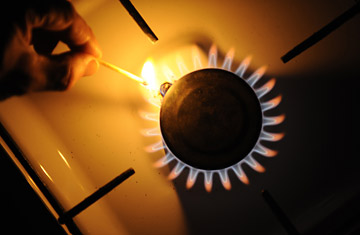
A man lights a match on the flame of a gas stove in a kitchen in Berlin
Russia's decision to choke off natural gas supplies to a shivering Western Europe couldn't have come at a worse moment — and that's just as Moscow would have it. As icy temperatures chill European households normally heated by Russian gas, a diplomatic race is underway to resolve the Russo-Ukraine dispute behind the cut. But Moscow seems in no hurry.
Wednesday marked the second straight day that many European nations received but a trickle of Russian gas pumped via Ukrainian pipelines. Ukraine is pivotal to Europe's gas supply; about 80% of Russian gas normally flows through Ukraine, and Russia provides 25% of Europe's gas. The latest cuts are the result of a dispute between Russia and Ukraine over the price Ukraine should pay for gas. Russian energy monopoly Gazprom says the per-unit price of $179 that Ukraine pays is a subsidized relic from the Cold War–era and that it is no longer offset by Ukrainian pumping services for Gazprom's clients in Europe. Gazprom wants to raise the price to $450 and also fine Ukraine's national gas company, Naftogaz, for allegedly expropriating millions of cubic meters of gas that Russia pumped through Ukraine to European clients. Naftogaz denies the diversion claims and says Moscow is using the gas issue as it has in previous years: to punish Ukraine for seeking membership in NATO and the European Union. (See pictures of Russia celebrating Victory Day.)
Moscow began turning off the gas to Ukraine's pipes on Jan. 1, and by Tuesday it had reduced the supply to one-fifth its normal flow. On Wednesday, it cut the supply entirely. By then, Austria, Hungary, Serbia, Greece, Croatia and Bosnia all reported a virtual shutoff in gas deliveries, and a resulting shortage in homes and businesses. So did Bulgaria, where the chill of the Russian gas cut was so swift — and where reserves are so low — that officials said they would consider restarting an unused nuclear power plant to compensate.
Gas interruptions were also felt in Slovakia, Slovenia and the Czech Republic, where deliveries from Russia dropped 70% or more. France and Italy also said that Russian gas flows were down 70% to 90%, though like most West European nations, both have larger reserves and are less dependent on Russian supplies than central and East European states.
But with Europe in the grip of an unusual cold snap, political leaders are pressuring Moscow and Ukrainian capital Kiev to end the standoff and get the gas flowing again. Officials from the Czech Republic, which currently holds the presidency of the European Union and was one of the first nations affected by the gas pinch, denounced the Russian move as "absolutely unacceptable" and demanded that the two sides strike "an accord within the week."
Naftogaz and Gazprom officials are set to hold talks in Moscow on Thursday, but a solution is far from guaranteed. Russian leader Vladimir Putin has a history of exploiting his nation's vast energy supplies as a political weapon. The dive in energy prices over the past six months has hurt Russia, but it has not killed Moscow's desire to be a regional player. "With both energy markets tanking and Russia's economy hit extremely hard by the global recession, Putin probably feels he has much to gain by trying to jack up gas prices and [get] badly needed revenues flowing into state coffers again," says Fabio Liberti, an expert on Russo-European affairs for the Institute of International and Strategic Relations in Paris. "Meanwhile, picking a fight abroad to distract and provoke public opinion when things look bad at home is a common political ruse — especially by Putin."
Liberti says Putin's use of energy as a political tool — and his recent defiance of Europe and the rest of the world in Russia's military clash with Georgia — may signal that the Russian leader believes he risks little more than short-term trouble in making internationally unpopular moves that serve his interests. Liberti also suggests that the winter freeze and the assumption of the E.U. presidency by the Czech Republic, an ex-Soviet satellite, may have added to Putin's motivations. "Putin is reminding Europe [that] Russia's a force to be reckoned with, and that its position on things like the Ukraine's desire to join NATO, the E.U.'s eastern expansion and the U.S. missile shield should be taken into consideration more to maintain international cooperation and harmony," Liberti says. "And he probably knows if the gas crisis only lasts two or three weeks, he'll probably wind up getting some of the concessions he wants without any dire repercussions to answer for."
